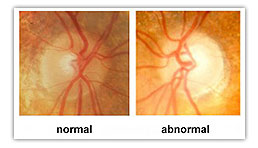What Exactly is Glaucoma?

Glaucoma is the general name for a group of eye diseases that damage the optic nerve of the eye. Glaucoma prevents the eye from sending accurate visual information to the brain.
Usually associated with gradual (and sometimes sudden) increases in pressure within the eyeball itself, glaucoma can result in partial or total blindness over time. The damage caused by glaucoma is irreversible, and it is currently the second-leading cause of blindness in Americans over the age of 40 in the United States.
It's often associated with a buildup of pressure inside the eye. Glaucoma tends to be inherited, and you should get yourself checked if others in your family have been diagnosed with this disorder. Over time, glaucoma will cause permanent loss of vision, and without treatment, glaucoma can cause total permanent blindness within a few years.
Contact Us
- Vision Plus - Corporate Office
2520 James Street
Bellingham, WA
Statistics
Currently, glaucoma affects nearly 2.5 million Americans with open-angle glaucoma being the most common form. While anyone can develop glaucoma, the disease is most common in people over the age of 40, particularly African Americans.
In fact, it is the leading cause of blindness in both African Americans and Hispanics in the United States. Currently, 50% of people with glaucoma are undiagnosed. People with a family history stand at a higher risk of developing the disease, and anyone over the age of 60 faces an increased risk of glaucoma.
Are You High Risk?
- If you are over the age of 40 and you have a family history of glaucoma.
- African-Americans should get a thorough check for glaucoma starting at every one to two years following the age of 35.
- If you have diabetes or high blood pressure.
- Hispanics in older age groups are also at greater risk for glaucoma.
- Steroid Users – adults who require approximately 14 to 35 puffs of steroid inhaler to control asthma have an increased incidence of glaucoma.
- Eye Injury – Injury to the eye may cause secondary open-angle glaucoma, which can occur immediately after the injury or years later.
Treatment
Glaucoma is treated with eye drops, laser treatments, or surgery. The goal of any treatment is to prevent loss of vision, as vision loss from glaucoma is irreversible. The good news is that it can be managed if detected early. With medical or surgical intervention most people with glaucoma will not lose their sight.
Taking prescribed medications regularly is crucial to preventing vision-threatening damage, and it is essential to continue to be monitored if you are diagnosed. There is a delicate balance between managing the condition and progression of the disease. Treatments may have to be changed over time to control progression.
Do you need a glaucoma test?
What is a Glaucoma test? Glaucoma testing involves measuring internal eye pressure and a detailed scan of the retina for signs of disease.
- Only a comprehensive eye exam can reveal whether or not you have glaucoma
- Increased pressure inside the eye is often a key indicator of glaucoma, though not exclusively so
- Eye doctors can use a number of tests for eye pressure but will, by default, check for signs of glaucoma as part of a detailed exam
- An examination of the Optic nerve and surrounding retina will need to be performed including a detailed visual field, an OCT scan of the optic nerve, corneal thickness mapping, and potentially an evaluation of the drainage system of the eye
I Knew my Gran had Glaucoma, and I Kept saying it can't happen to me, but low and behold I had an early-stage, open-angle glaucoma... so I got immediate treatment for it, which my optometrist said should delay the progression of the disease. Disease at 44? Ack! But good news! All I have to do is put in my prescribed eye drops! Phew

Early detection of Glaucoma is key to having a successful outcome. Glaucoma is a complex condition and many tests are used to screen for the disease. To monitor our patients for glaucoma we measure their eye pressures, their corneal thickness, and have them undergo a detailed optic nerve evaluation with our optometrists. If any risk factors are seen during the examination our doctors will order additional testing. At Vision Plus we have the most sensitive tests for detecting glaucoma early. Our OCT is able to give an objective measurement of the amount of nerve tissue inside the optic nerve head.
With Glaucoma, nerve tissue inside the optic nerve is damaged and lost over time. The OCT is essential for early detection and will pick up loss of nerve tissue quickly. The other additional test we perform is a visual field test. This assessment checks a patient's peripheral vision because this is the first place vision is lost during Glaucoma. Glaucoma does not have any initial symptoms and it is important to have annual eye exams to monitor for the disease. Book your glaucoma consultation today. BOOK NOW
